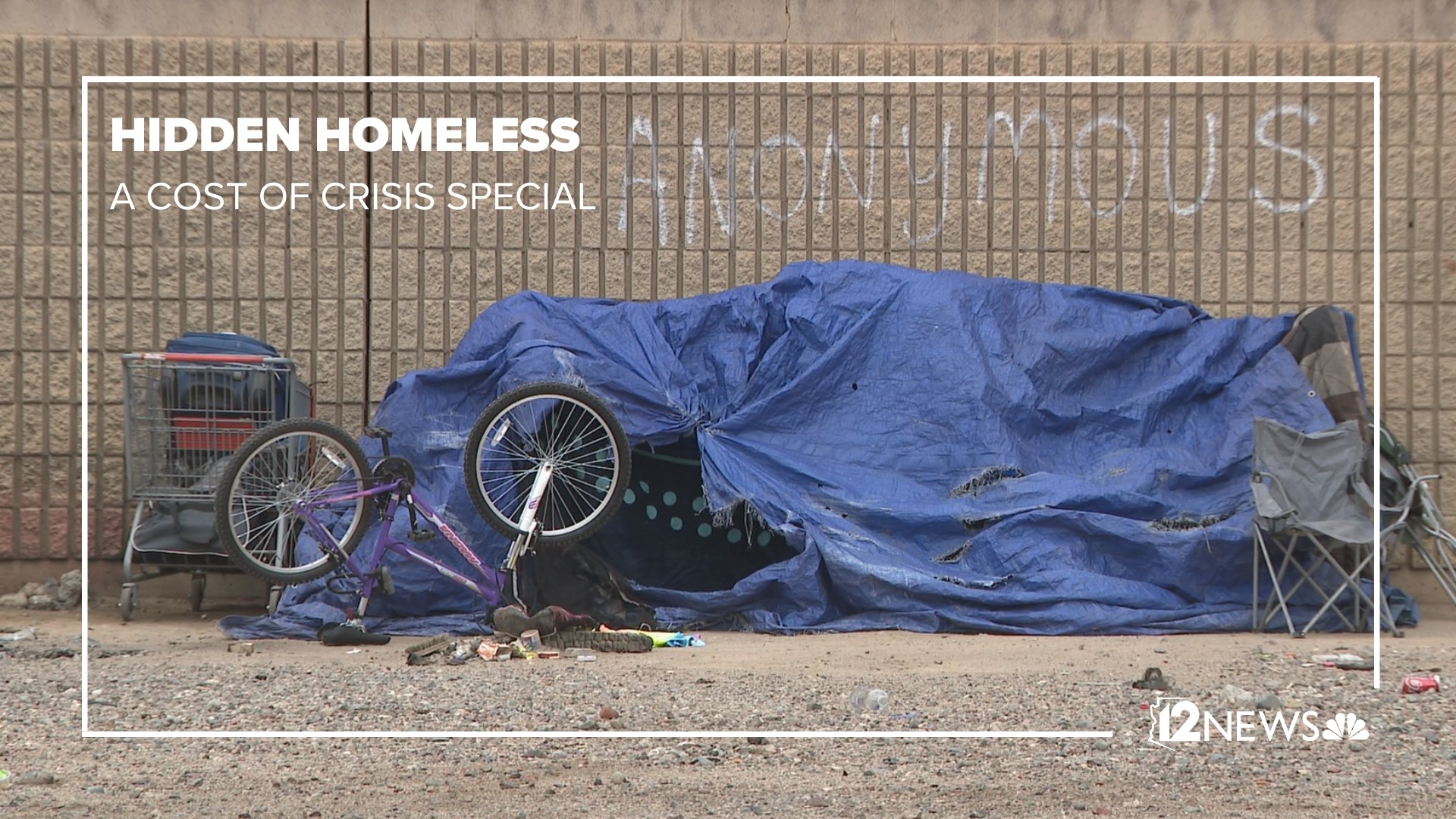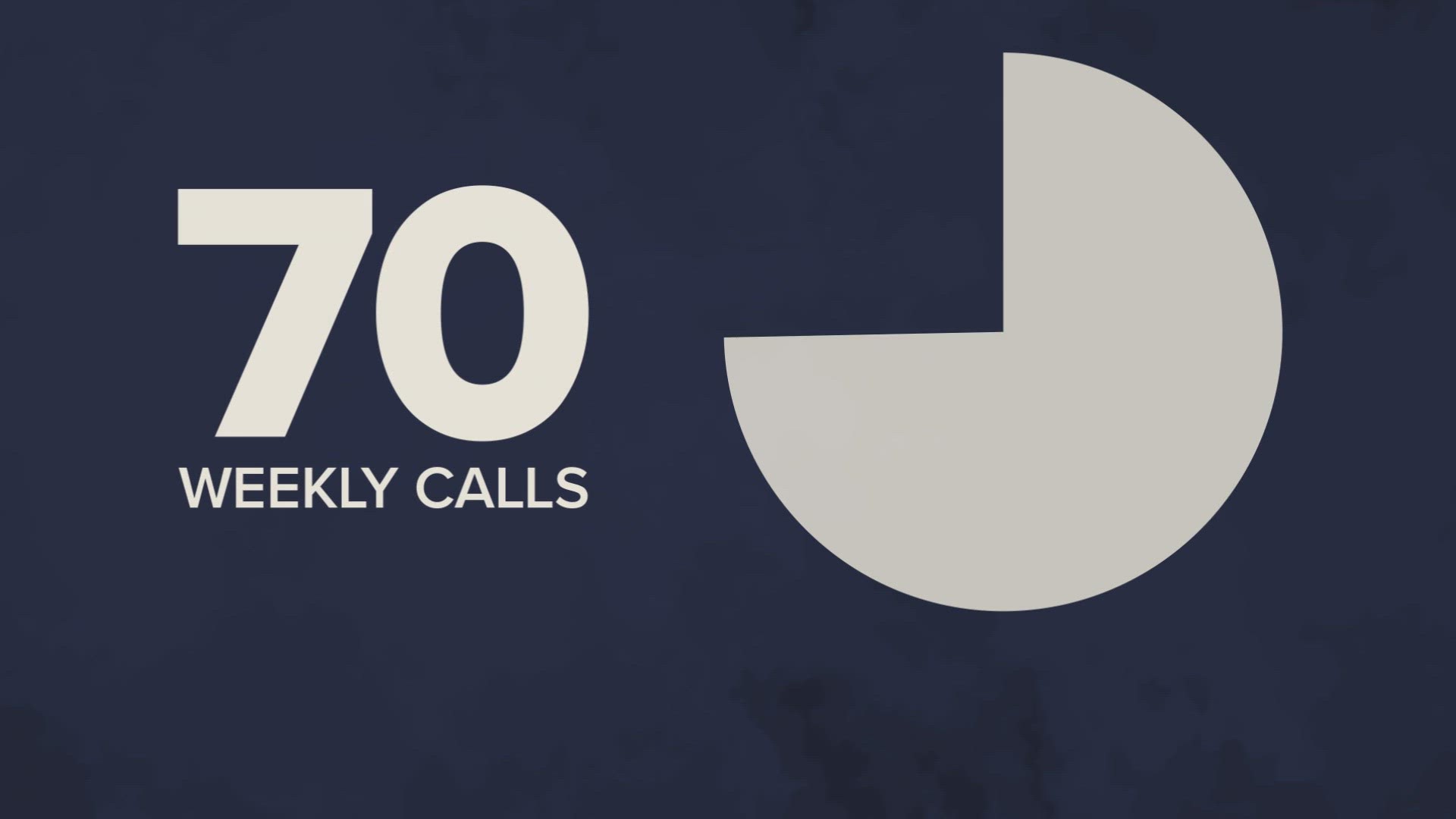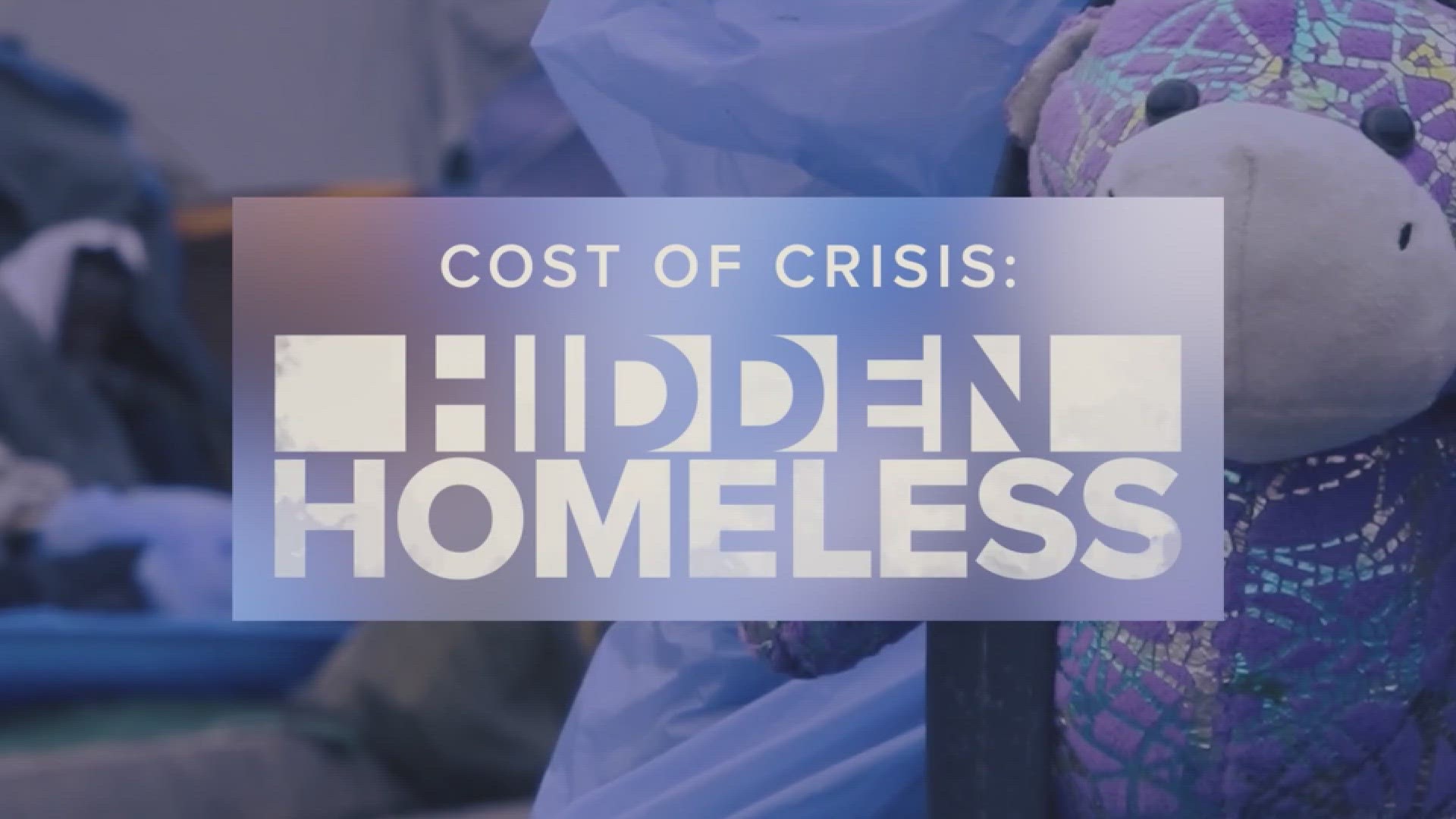Hidden Homeless: Resources are scarce for pregnant women living on Arizona's streets
A fetus found in ‘The Zone’ homeless encampment shed light on the gaps in care for pregnant women experiencing homelessness.
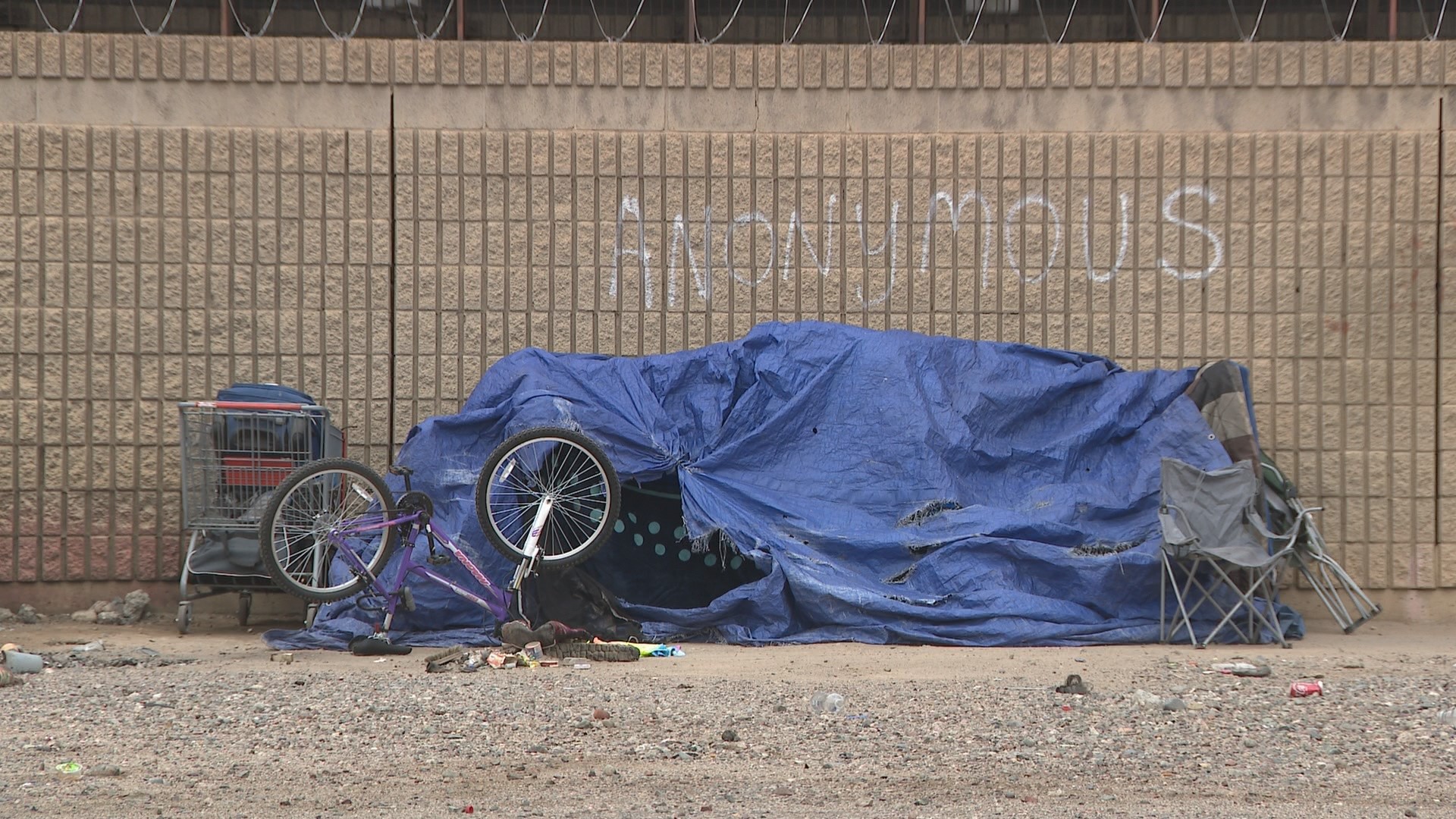
‘Just telling myself it could be worse’ Pregnant woman struggles to find shelter while living in an SUV
The white Chevy SUV blends in with the other cars in the parking lot. If you’re just walking or driving by, you’d probably never realize that two people were calling the vehicle home.
“This is the very first time for me to ever be in this situation,” said Jane, who shared she’d been homeless for less than a year.
12News changed her name due to her circumstances.
“It’s hard,” she detailed.
“It’s cold,” her partner added.
“Yes,” Jane continued. “Cold now. And we really don't like to turn it on - the heater - because it runs out the gas and then we're going to be stuck without gas. So it's hard. It's been really cold at night, actually.”
Jane and her partner said they started living in their SUV after they lost their jobs and drained their savings.
“We're slowly spending our money that we did have put away,” Jane shared. “And it just ran out quicker than what we expected.”
And the need for housing is all the more urgent because this pair is about to become a trio.
“When the baby comes I should hopefully have a place by then,” Jane said with uneasy confidence. “I'm more than sure we will make it.”
She never expected she’d be homeless and pregnant. But here she was, 43 years old, not exactly sure how far along she was in pregnancy.
“I was in shock,” she said. “Because of my age. I wasn't trying to have no more kids right now. But I'm happy. I’m happy. But at the same time, it was scary knowing that we're going to have another baby - well, I'm going to have another baby in this situation.”
She and the baby’s father met with the 12News I-Team at a park in a central Phoenix neighborhood where they’ll sometimes stay in their SUV. They often change neighborhoods or drive around throughout the day, but they don’t go too far in an effort to save gas.
“At least we have our vehicle to sleep in,” Jane explained. “There’s a lot of homeless people that don’t even have that.”

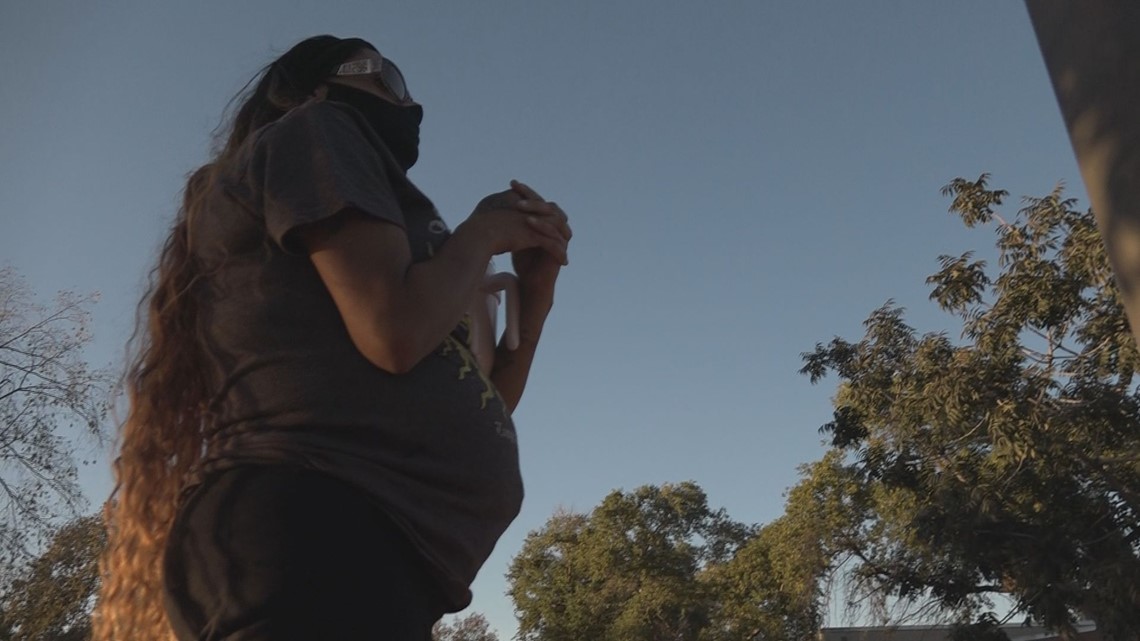
Arizona does not track homeless pregnancies
A gut-wrenching 911 call back in November 2022 made it clear that the 12News I-Team needed to start digging into the newest generation being born into homelessness.
On that November night, emergency crews called to “The Zone” Phoenix’s largest homeless encampment after someone reported a child in the middle of the street near 11th Avenue and Madison.
RELATED: 'It's utterly horrific': Neighbors react to dead fetus found near homeless encampment in Phoenix
Police later learned it was the remains of a 20-24 week old fetus left by a fire, next to a dumpster in the heart of the encampment. Police believed this case was a miscarriage and prompted questions on whether there are enough resources for pregnant women experiencing homelessness.
Despite a growing homeless population in the Phoenix metro area and the city’s largest homeless encampment being just a few blocks east of the state Capitol, Arizona doesn’t track homeless pregnancies like some other states do.

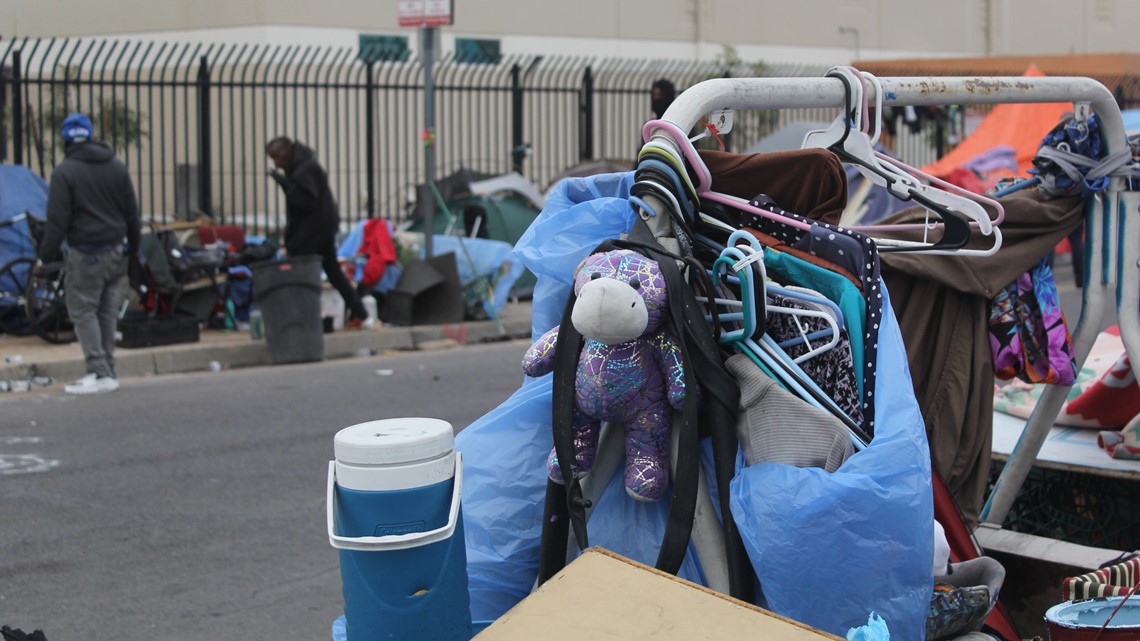
Arizona’s Department of Health Services tracks births each year, but doesn’t monitor if a baby is born into homelessness. Cities don’t collect this data when they go out for the annual point-in-time homeless count. And state agencies like Arizona’s Department of Child Safety (DCS) or the Medicaid program, AHCCCS, don’t track this data either and have no specific programs to help this specific population.
“I think it is a huge, underreported, under-statted, under-resourced, big problem,” said Whitney Thistle. “Everybody sees it. You drive down any street and you can see there's encampments on the overpasses, in the dirt lots. And pregnant homeless women and families are kind of the hidden homeless.”
Whitney Thistle is the Vice President of Philanthropy at Maggie’s Place, which has four maternity homes throughout the Valley and a hub for resources in central Phoenix.
The non-profit is one of the only providers we found that works exclusively with pregnant, homeless women.
“We're very well known at the street level,” Thistle explained. “And so if you are homeless and pregnant and living on the street, chances are someone on the street knows where to send you. We're very niche, right?”
Right now they have 26 beds across their four homes. Each night, they’re typically maxed out. And the best Whitney and her team can do to pinpoint the number of women who need help is to look at their call volume.
“And it's been pretty steady for a couple years,” Thistle said. “About 70 calls a week of women who are actively seeking resources. They are living on the street or they might be on a friend's couch or something, but they're pregnant and without housing, and we are unfortunately unable to serve them because we are at capacity.”
Of those 70 weekly calls, she estimates about a third are repeat women, desperate week after week to find someplace to stay. The rest are unique.
“We want to help every single person that calls,” Thistle explained. “It's really hard to say ‘I'm sorry, but we're not able to help you today.’”
She added that many of the women who turn to them for resources have experienced some kind of trauma like human trafficking, domestic violence, or substance use.
“I think that our moms who come here and show up are ashamed,” Thistle shared. “And I wish that I could take that from them.”
There aren’t a ton of other options for pregnant women experiencing homelessness and oftentimes a woman has to meet certain criteria to get help.
“We are not the right setting for severe mental illness, for example,” Thistle shared. “That requires a higher level of care. We're not a licensed facility. We’re also not the right fit for women who are actively fleeing domestic violence because we live in community.”
Most resources aren’t equipped to meet all of the different needs an unsheltered pregnant woman might have. Sometimes the help is unwanted or challenging to navigate from the streets.
“If you don't have family or friends that you trust that you can go to for advice, resources, direction, it's really hard,” Thistle shared. “It's very isolating.”
If you or a loved one is experiencing homelessness, there are places you can go for help:
- Maggie’s Place – www.maggiesplace.org
- Email Whitney at wthistle@maggiesplace.org
- 602-596-4992
- West Valley Health Equity and West Valley OBGYN
- https://wvhealthequity.com/
- 623-400-5881
‘What’s going to happen to that baby?’ Not enough shelter space or resources
When people are hiding, whether it’s by choice or by circumstance, it’s hard to know exactly how big the need can be.
“It’s just terrible,” said Dr. Yvonne Patterson. “Tragic.”
Dr. Patterson’s heart sank when she heard about the fetus in “The Zone,” especially knowing her clinic is just steps away on the Human Services Campus. She’s the Outpatient Medical Director with Circle the City, a nonprofit that provides medical care to those facing homelessness.
“I would think that she should have sought out emergency medical treatment care,” Dr. Patterson shared. “Maybe in an emergency room, or at the very least walk into our clinic, and then we would have called for emergency care.”
There are no maternity specialists with Circle the City, so they typically refer women for specialty care to Valleywise Health Medical Center or try to find other non-profits that could help shelter expecting moms.
Dr. Patterson estimates that she’ll see a pregnancy once a month at the clinic and Circle the City’s mobile unit teams often don’t come across pregnant women when they’re out on the streets.

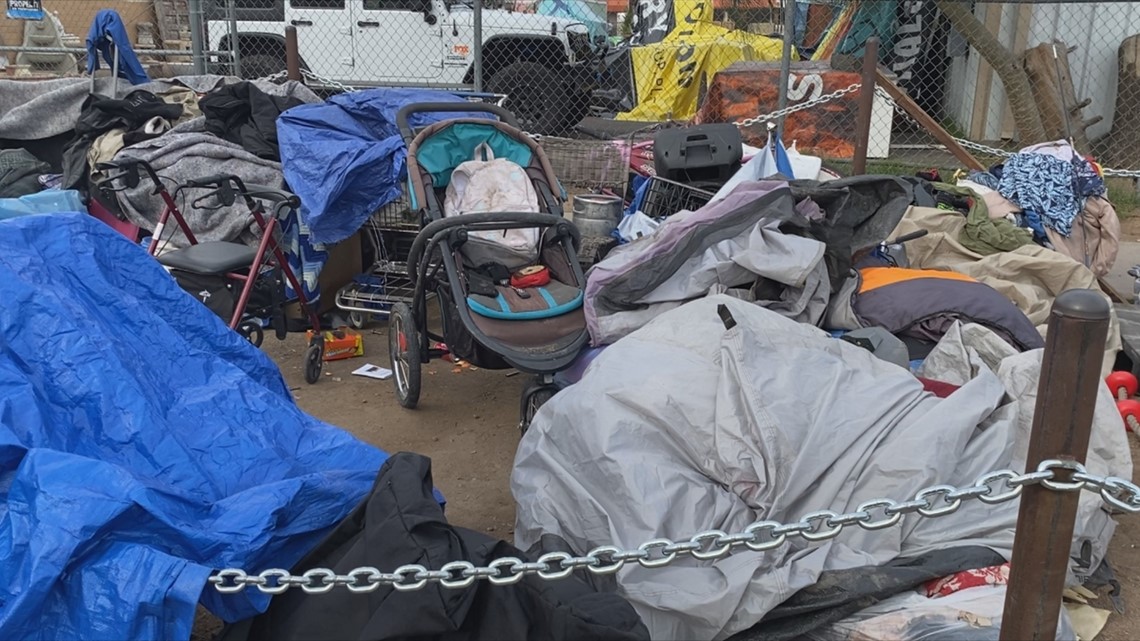
“Most of the time if somebody's pregnant and we refer them, we won't see them again,” Dr. Patterson explained. “It's not that we won't, but they don't come back.”
“We probably see more patients who are experiencing either true homelessness or housing instability much more often than we actually believe that we are,” said Dr. Bidisha Ray, an OB-GYN at Valleywise.
Valleywise Health Medical Center doesn’t track homeless pregnancies either, but Dr. Ray says it’s definitely something she sees but not always something patients are willing to talk about.
It’s not always obvious. She said she’ll look for clues like patients carrying a lot of clothing or bags of food that won’t spoil.
“Patients can be very fearful that they may be judged, that they may have their children taken away from them or that during pregnancy they may have cases where they have their child taken away from them after birth,” Dr. Ray shared. “So patients are very, very leery of even wanting to disclose that they may be experiencing these problems.”
A spokesperson for the Department of Child Safety stated in an email to 12News that “being unsheltered by itself would not be grounds for a DCS investigation,” but pointed out that other allegations of abuse or neglect could prompt a department investigation.
>> Live, local, breaking. Download the 12News app
Still, the fear of losing custody of a child is something other homeless services providers have witnessed, too. And it’s another reason a person might not seek resources that could help.
“Quite often, they don't want no help,” explained Rich Heitz, lead Outreach Case Manager with the Phoenix Rescue Mission. “They already have a plan that they're going to do it all on their own. And it doesn't always work that way.”
Heitz spends his days driving around the Valley trying to find and help the hidden homeless. He estimates that every few months he’ll come across someone who is pregnant.
“The fear that strikes into my mind like, ‘What’s going to happen to that baby?’” Heitz shared. “‘Is that baby going to make it? Is that baby not going to make it?’”
What he can offer is a space in one of the Rescue Mission’s programs or a partner provider if there’s room.
“[It] just all depends on the waiting lists that are involved,” he explained. “If there's openings or not. If there's not, then we have to keep searching for another place.”
That search can be tough.
“Pregnancy itself may actually be a criteria by which patients are excluded from certain shelters,” Dr. Ray shared. “When they have a young child that they bring back after having a delivery, they now have to make sure that they go to a family shelter. There's certainly not enough availability for that either.”
Dr. Ray will work hand in hand nearly every day with hospital social workers like Andrea McCluskey.
“As a social worker who wants to get somebody immediate access to the services, they need to know that they're on waitlist,” McCluskey said. “They're doing everything they can, but yet they still can't get into a place. It’s heartbreaking.”
The 12News I-Team couldn’t identify a shelter in the Valley that would meet all of Jane and her partner’s needs
“He will park in a safe spot,” Jane said. “I'm not really scared when I'm with him because I know that he does everything for the best of me.”
The couple usually parks their SUV at gas stations where they might be able to access a public bathroom and snacks. She gets prenatal vitamins over the counter.

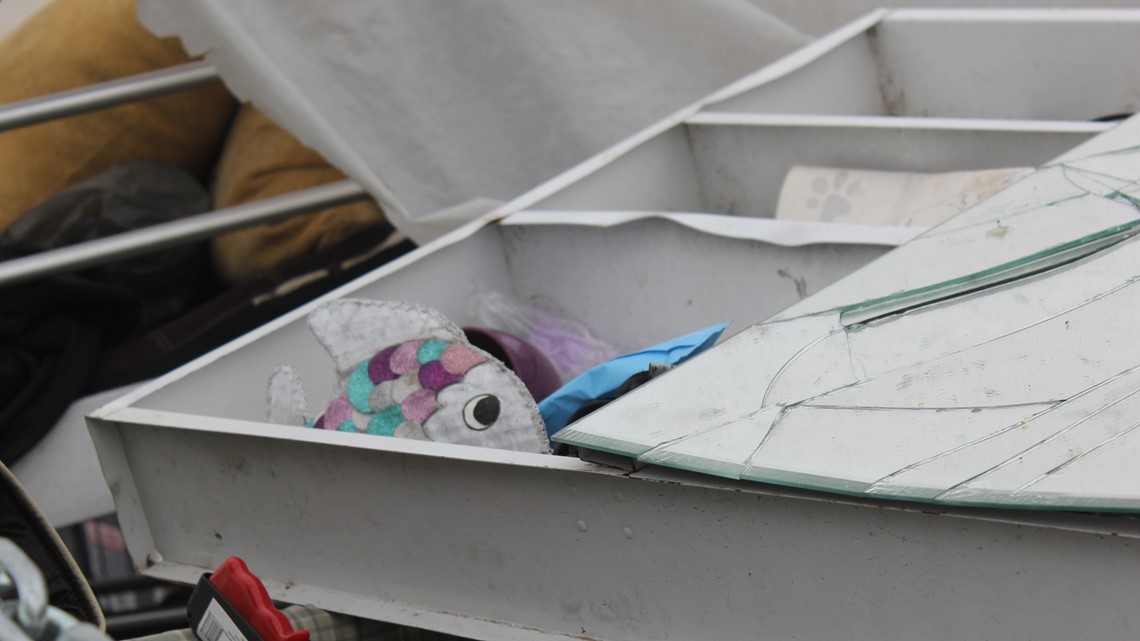
When we first met her just before Thanksgiving in November 2022, she said she hadn’t gone to a doctor yet. Her bump was getting bigger by the day and her ankles were clearly swollen, as she braced herself each night to cram into their SUV.
“We get up every morning, like four in the morning,” she explained. “Start our day and try and find palettes. Right now that's what the thing is. So, we're not trying to get locked up and get in trouble doing any you know, wrong. We're too old for that. We don't need any more problems.”
They try to earn money selling the palettes, which could cover a motel room every now and again, but it’s becoming harder and harder to earn the funds.
“I just want help getting into a place so we can relax, maybe a week, put our feet up and soak in the bath or something and then you know, give us time to go get a job,” she shared. “It's really hard.”
What makes their search for shelter harder is that they want to stay together, especially with their baby on the way.
“There's no resource for couples at all,” Jane said. “It's either the female has to go into some kind of program or the male has to go into a program. It makes it more complicated where they won't even probably help you out.”
Most shelters 12News identified won’t take couples together. And if there’s a newborn or other children in the mix, oftentimes only the mother can stay with them in the shelter setting.
Repurposing hotels as shelters
In 2022, Maricopa County tried something new.
“We were testing what would happen with allowing couples and allowing pets and it's been an enormous success of getting more and more people in who would not have otherwise engaged in services,” explained TJ Reed.
Reed is the Homeless Programs Manager for Maricopa County. The shelters he’s talking about are located in the county’s bridge hotels, where each room is converted into temporary shelter space to help people transition into permanent housing.
When we interviewed Reed in January 2023, he said the county had 283 rooms across four leased hotels, but could serve more people than that because they took in couples together. The county said it has served women who are homeless and pregnant in the hotel system, but didn’t provide data on how often and pointed out that their population skewed more male.
Funding for the hotels, in part, comes from COVID relief funding awarded to Maricopa County through the American Rescue Plan Act. Reed said the county is working to buy the hotels so they can continue the program after the ARPA funding runs out in 2024. In November 2022, the City of Phoenix opened its own version of a shelter hotel.
And like other homeless services, resources are finite.
“All of our hotels are almost always full,” Reed said. “There's such a drastic need out there that the only time typically that we will see when there's vacancies for multiple days are if there's a staff capacity issue or a room is closed for renovation or cleaning.”
And there are catches. You can’t just walk up and expect to get a shelter space. A person would have to be referred to the program. No drugs or alcohol are allowed on-site although people can be connected to resources for recovery and sobriety. And there are case managers working with people in each room to plan steps away from homelessness.
“You're not just homeless,” Reed said. “You're homeless because of something else, right? You're homeless because you don't have enough money to pay for rent, because of a disability because of substance use issues. You name it.”
If you or a loved one is experiencing homelessness, there are places you can go for help:
- Valleywise
- www.valleywisehealth.org
- 1-833-855-9973
- Circle The City
- www.circlethecity.org
- 602-776-0776
- Maricopa County
- www.Maricopa.gov/HelpWithBills
- Call 211 or for emergency rental assistance and other help
- Phoenix Rescue Mission
- https://phoenixrescuemission.org/help/
- 602-233-3000
- Human Services Campus
- https://hsc-az.org/
- 602-282-0853
‘A lot of times they’ll use to cope’ Gaps in care for pregnant women impacted by substance use
At first, Penny thought it was a mistake.
“I was in jail when I found out I was pregnant,” she said.
She asked the jail staff to do her urine test again but only got confirmation that she was indeed pregnant.
“They're like, ‘No, you're pregnant,’” she said. “I'm like, ‘No, I'm not.’ So yeah, it was a lot of denial.”
Penny said she had been living on the streets on and off since she was 14. We’ve changed her name due to her circumstances.
“I stayed in central Phoenix,” she remembered. “So mainly on Central. Anything that was close to the light rail. They run early hours so if I got cold or too hot, I’d jump on the light rail.”
Now age 30, she’s endured a lot to simply survive.

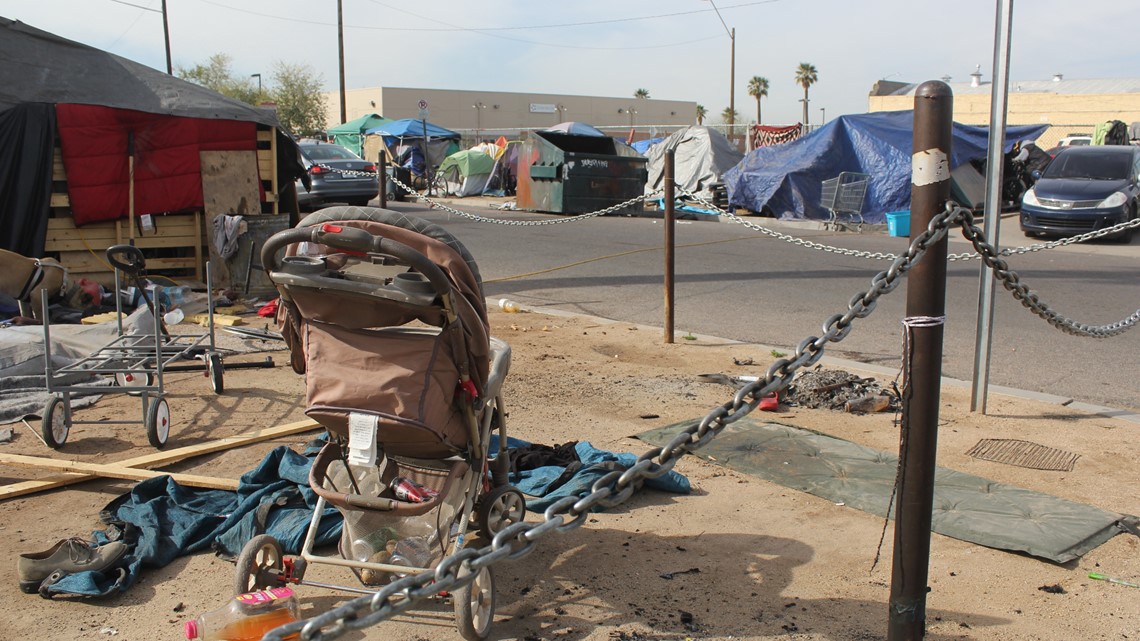
“I was sexually assaulted a couple of times being out there,” she shared. “You can't really rest while out there. You rest but you can't rest as well. I started going to psych wards, you know, lying saying I was suicidal just to have a warm place to sleep and have a good meal.”
She struggled with sobriety and that jail booking was a wake-up call.
“What am I going to do?” she thought to herself. “I can't be pregnant again. I can't have another child. You know, I'm not even in a good position to have another baby.”
Healthcare providers see 'crazy' amounts of substance use
The 2022 Point in Time count details that more than 1,100 people experiencing homelessness surveyed in Maricopa County said they struggled with substance use. The report is considered an underestimate of the entire population.
“The amount of substance use is crazy,” said Helen Bujak, CEO of West Valley Health Equity and West Valley OB-GYN.
Of the 5,000 to 6,000 women they see in their office each year, Bujak estimates that 3% to 5% or up to 300 pregnant women are unsheltered. And Helen and her team see firsthand how homelessness can lead to other health concerns for mom and baby.
“If you're homeless, it’s scary,” said Charrisa Riggs. “I can't tell you how many women have told me that they've been raped because they fell asleep because they couldn't stay awake. And so a lot of times they will use to cope, whether that's methamphetamines or opiates, whatever they might be able to get their hands on."
When we first went to their office in January, it was Charrisa Riggs’ first day on the job. She’s an Intensive Treatment Coordinator brought on in part to navigate the rising, overwhelming number of women who come to them facing substance use issues.
“Our biggest concern is when moms are having withdrawals,” Riggs explained. “They don't feel well. So, they're not drinking, they're not eating, they're not sleeping, they're not taking care of themselves, which is all crucial in development of baby and helping baby meet those milestones. So when that's not happening, then that's when we see delayed growth which leads to poorer outcomes.”
Substance use caused 176 child deaths in 2021 in Arizona, according to the state health department’s latest child fatality review.
Of that number, nearly a third were less than a year old. All the deaths are listed as “100% preventable.”
The state does not go further to break down how many of these babies were also experiencing homelessness. However, it explicitly links substance use to homelessness, recommending, in part, that communities should “expand access to services for people with unstable housing”
“There’s a lack of beds,” Riggs added. “There’s just a lack of space. I mean, there are resources but they’re so small and there’s definitely not enough to meet the need.”
Helen’s husband, Dr. Nicholas Bujak, is the OB-GYN at their clinic. And sometimes their family has gone so far as to put up their patients in hotels to try and ensure they get drug treatment along with prenatal care.
“He often is coming to me and saying, ‘Hey, can you get the hotel room for this many nights?’” Helen shared. “So they at least don't have to be on the street so that they don't get lost and they make it to their treatment spot. Because that's what often happens is we get them to commit and get them excited, 'okay, they're going to do this, we want to make this change, we're going to do it!' But then if the beds aren't available for three to five days, that's three to five days that we can lose them to the substance and they won't show up.”
Helen adds that their plan doesn’t always work to keep patients away from drugs or off the streets, but they’ll keep trying to do all they can until the resources catch up to the need.
“It's one of those things that he always will tell me, ‘Even if I can affect one out of 100 people and make that change, then it'll be worth it,’” she said.
‘Transient’ death investigations
The one place the 12News I-Team found that does track whether a baby was unsheltered is the Office of the Maricopa County Medical Examiner when it’s investigating deaths.
In data obtained by the 12News I-Team, the office labels these deaths as “transient.” Last year, the office investigated at least three of these deaths involving fetuses, listed as age zero.
In all three cases the mother tested positive for drug use. One mother told doctors that she didn’t even know she was pregnant and had just used meth and fentanyl that morning.
“The reality is that many rehab centers also do not accept pregnant patients,” Dr. Ray said. “And then that subsequent lack of access to rehabilitation, drug rehab, however you want to look at that, then sort of trickles down to babies in our Intensive Care Unit or unfortunately babies that may end up in the medical examiner's office.”
Those deaths reported by the medical examiner are just a snapshot of Maricopa County, an under-representation of the hidden homeless statewide.
“I think it would just be groundbreaking to show that there really is this huge need - this unmet need in this population,” Riggs said.
“And we want to follow these women and follow these things and start tracking and collecting data and start journaling that so there can be an argument of the standard of care,” Helen Bujak added. “If we ignore this, we're missing a huge level of diagnosis.”

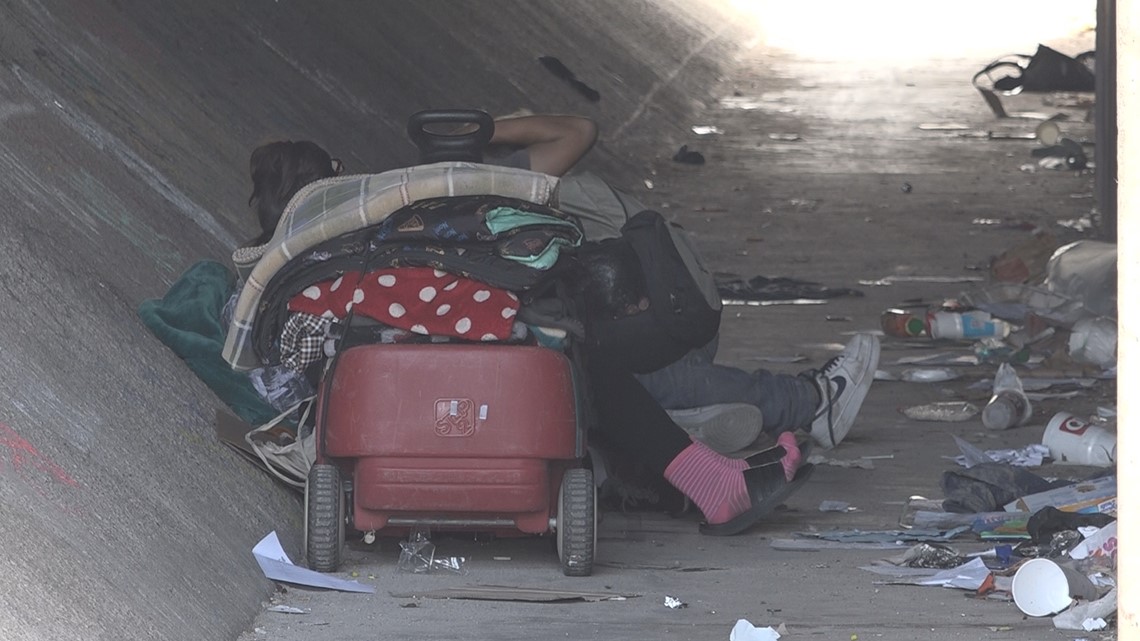
'It's not cheap' Cost of Crisis
The team at West Valley Health Equity is trying to fill the gaps in care that they’ve been working to identify. In February 2023, they opened a new 16-bed shelter space in Phoenix that serves pregnant and parenting moms with kids. They’ve only been open for about a month and already have a growing wait list.
“Who else is going to do it?” Helen Bujak and Charissa Riggs said in unison, when asked why their doctor’s office should take on sheltering. “No one else is doing it.”
Operating services for pregnant, homeless women is not easy. It’s not easy emotionally and it’s not easy financially.
“We desperately need more access to resources,’ said Dr. Ray. ‘And unfortunately, that comes at a cost from a community standpoint. We already are at the limits, if not beyond of what we are capable of doing with the funding that we have available to us.”
If shelter or housing assistance isn’t available for patients in need, Dr. Ray and the team at Valleywise have gotten creative, connecting patients with utility, food and public transportation subsidies instead. She hopes this will help not only patients who are actively homeless but patients who might be close to losing housing as a way to prevent homelessness.
“And then patients are able to reallocate the funds that they would be otherwise using for utilities and food, potentially transportation towards their rent.”
West Valley Health Equity and West Valley OBGYN rely on grants and Medicaid reimbursements.
“[It’s] not cheap,” Helen Bujak stated.
For their new house, with wrap around services for women in their care, the budget is hard to predict.
“Are we talking about a single mom?” Helen explained. “Are we talking about a pregnant mom? Are we talking about a pregnant mom with children? I think all of those variables would change it dramatically.”
The program also helps women navigate other resources like housing or cases opened by DCS, in addition to providing food and shelter.
“WIC will cover a lot of the food expenses but some of the things that would fall short is diapers,” Helen said. “We're always going to need diapers. That's an expense. Car seats, pack and plays, things like that. Those are things we’ll always have an endless ask for.”
For Maggie’s Place, every penny matters.
“It costs about $26,000 a year to house one mom,” Thistle stated.
And like many providers, inflation is creating extra challenges. Thistle explained that their biggest need right now other than more bed space is their food pantry. The resource serves not only the moms who are actively staying at a Maggie’s Place home, but any mom who has graduated from a Maggie’s Place program.
“Once the food is stocked, it's gone,” she said. “We are seeing moms who maybe haven't come to us for donation items before coming out of the woodwork for those items. Because, you know, it's expensive.”

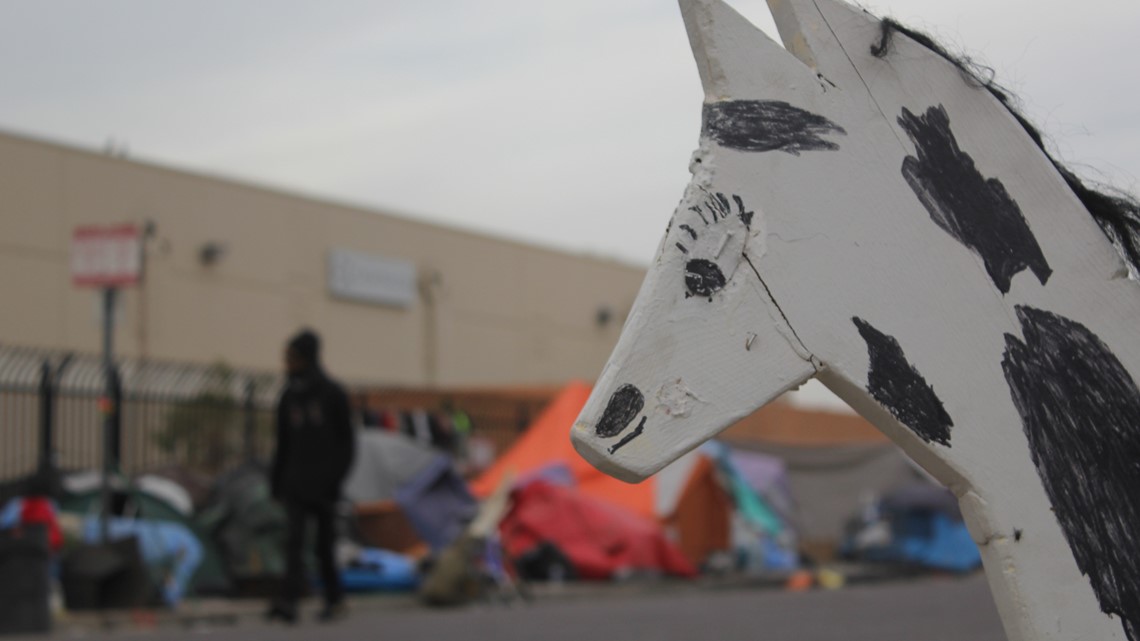
State funding for ‘Homeless Pregnant Women Services’
The 12News I-Team uncovered that the state budget has actually earmarked spending for homeless, pregnant women since at least 2018.
The contract was awarded to Maggie’s Place, first for $100,000 annually, then in 2022 it doubled to $200,000 each year. But now, Maggie’s Place stands to lose the state funding.
Governor Katie Hobbs’ 2024 budget proposal aims to revert that $200,000 back to the state health department so it can be used for “pregnancy services that are inclusive of all options and support personal choice.”
When the contract was awarded to Maggie’s Place, state documents show that the money could not be “granted for abortion referral services or distributed to entities that promote, refer or perform abortions.” Thistle stated that Maggie’s Place is a politically neutral non-profit organization that provides shelter and support to pregnant women experiencing homelessness.
Despite several requests since early February, a spokesperson for Governor Hobbs wrote over email that the office was unable to provide an interview for this report.
In emails, 12News asked what went into the decision to reallocate the funding.
The spokesperson said that the administration does not consider Maggie's Place to be an "inclusive pregnancy service" because it is "not a healthcare provider."
“Out of a $17 billion budget to cut $200,000 from an agency that is really living and breathing, supporting women in our community, that is a little bit alarming,” Thistle stated. “It's disheartening.”
Other providers we’ve identified, like UMom and Community Bridges, operate under their own budgets and have their own limits to how many people they can serve at one time. Again, no place is a one stop shop for all the resources a homeless, pregnant woman might need. The services are fractured and makes the system of care difficult for a woman in need to navigate.
“I think there's more money, but there's also more coordination and strategy,” said TJ Reed with Maricopa County. “Like you could throw as much money as you want at some of these problems. And they wouldn't be resolved unless you're doing it in the right way."
- UMom
- https://umom.org/find-help/
- 1-800-631-1314
- Community Bridges
- https://communitybridgesaz.org/
- 1-877-931-9142
‘Only I can get us out of it’ A new generation born into homelessness
After Penny was released from jail in August 2022 with the new shock of her pregnancy, she sought help for herself and her new baby on the way. She was tired of sleeping on the streets, anywhere she could find to lay her head.
“Me just sitting there one day and just having a conversation with God, like ‘This isn't me.’” Penny shared. “I’m just tired of this. I want my life back.”
She started a faith-based program at the Phoenix Rescue Mission’s Changing Lives Center, where she’s sober, on a strict schedule, and working through past trauma. She has chores and work but is on light duty with her pregnancy. The light duty means she often helps with kitchen prep.
“Come to me and I’ll add the flavor,” she jokes.
When we visited with her on a Saturday morning in January, she was working with the other women to clean the kitchen. She explained it was a weekly ritual, one that keeps her busy.
As she moved around the kitchen, she smiled and laughed with the other women by her side. She later showed us the chapel, her favorite building on the campus. She takes time to pray daily and shared that she relies on faith during this time of transition.
“My higher power keeps me going,” she explained. “And just my determination to want to be a better woman and a better mother.”
At the end of the day, she can lay her head on a bed in her own space. She eagerly pointed out her apartment on the campus. She credits the consistent roof over her head as part of what’s making her recovery possible.
“When you’ve been to jail, this is luxury,” she joked.
Despite it all, she considers herself lucky, knowing other women in her shoes might not have the same access to help.
“I know it’s not going to be easy, but I’m excited,” Penny said. “I’m happy.”
The team at the Phoenix Rescue Mission said that as of our publication in March 2023, Penny is still expecting her baby and still working through the steps of her program.
Jane's difficult road
We lost touch with Jane in January 2023. The phone numbers we had stopped working and the 12News I-Team learned she’d been booked in jail.
It turns out Jane was facing forgery charges from a case last year. She’d missed at least two hearings and the judge issued a bench warrant. She was arrested again in late January 2023.
In court video, Jane explained to the judge that she tried to make it to a December hearing but went into labor instead and couldn’t make it.
“I have a newborn at home,” Jane told the judge. “There’s no way I can go home today?”
Jane tried to explain to the judge that she didn’t know she missed hearings. The I-Team reviewed court records showing that notice sent to Jane was returned to the sender. She clearly didn’t receive mail while she was living in the SUV.
“I didn’t know I had one,” Jane told the judge. “And I don’t have money to make bail. And I have a newborn at home. I don’t have family here. It’s just me.”
She told the judge she gave birth to a baby girl who was born prematurely. After the birth, Jane said she got sick and had to get a blood transfusion, putting Jane in the hospital. She begged the judge to change her bond so she could get out of jail and take care of her newborn.
But this time, a judge wasn’t going to let Jane leave on her own.
“Please, ma’am! I’m begging you,” Jane pleaded in court, before she was taken back to jail. “I promise I’ll do everything.”
We wrote to Jane in jail and she even tried to call us, but the call from the jail was screened as spam.
The Maricopa County Sheriff’s Office confirmed she was released in February after taking a plea deal. She was sentenced to probation and in a court hearing, she told the judge she had a place to go.
“Do you have a place to stay?” the judge asked.
“Yes, ma’am,” Jane said, without hesitation.
We tried to find her. The address listed on the police record was an old one and a new family was already living there. We looked for the SUV in the parking lots they frequented before, but no luck. Her attorney couldn’t reach her for us either.
We thought we lost contact with Jane for good until she reached out from a new phone in mid-March.
She said she was still living in the SUV with her partner and their baby. She said any attempt to find a shelter that would take them all was unsuccessful. She also had to worry about a new felony conviction and probation, which could also impact her ability to get into a shelter.
When we talked to her in November 2022, she was an open book. Despite her circumstances, she was eager to start a new chapter.
“It’s really hard,” Jane said in that November interview. “But only I can get us out of it. Only he can get us out of it.”
For now, the road ends here. With another generation hidden amid Arizona’s homeless crisis.

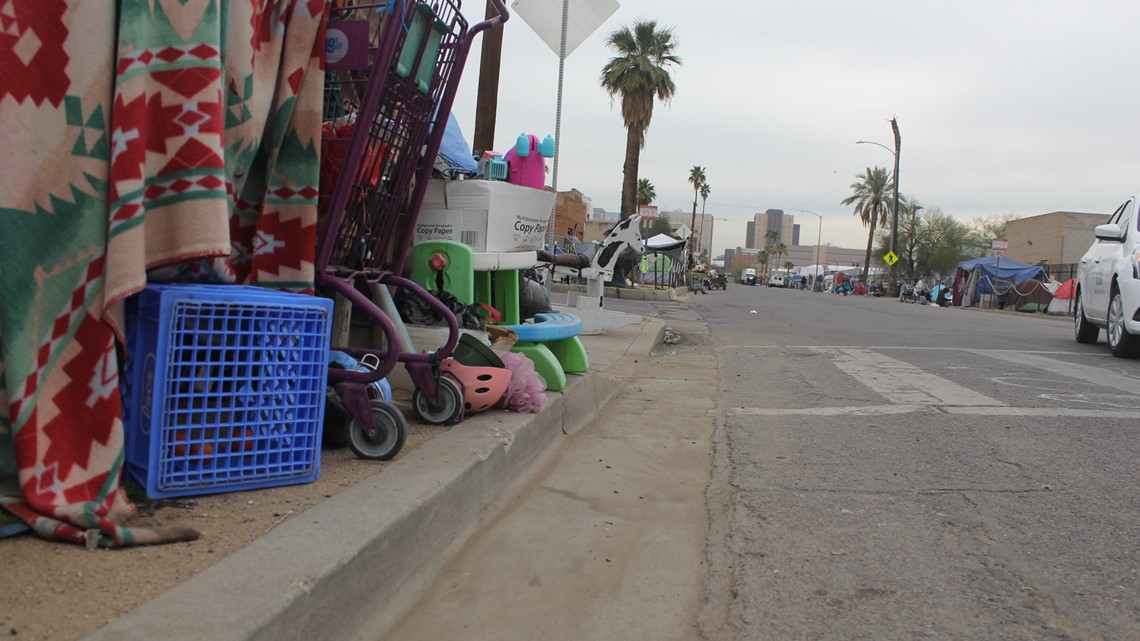
I-Team Investigates
Award-winning journalism and fact checking from the 12News investigation team.
You can find a full list of the homelessness resources detailed in this story below:
- Maggie’s Place – www.maggiesplace.org
- Email Whitney at wthistle@maggiesplace.org
- 602-596-4992
- West Valley Health Equity and West Valley OBGYN
- https://wvhealthequity.com/
- 623-400-5881
- Valleywise
- www.valleywisehealth.org
- 1-833-855-9973
- Circle The City
- www.circlethecity.org
- 602-776-0776
- Maricopa County
- www.Maricopa.gov/HelpWithBills
- Call 211 or for emergency rental assistance and other help
- Human Services Campus
- https://hsc-az.org/
- 602-282-0853
- Phoenix Rescue Mission
- https://phoenixrescuemission.org/help/
- 602-233-3000
- UMom
- https://umom.org/find-help/
- 1-800-631-1314
- Community Bridges
- https://communitybridgesaz.org/
- 1-877-931-9142
- PHX CARES
- https://www.phoenix.gov/phxcares
- 602-262-6251


